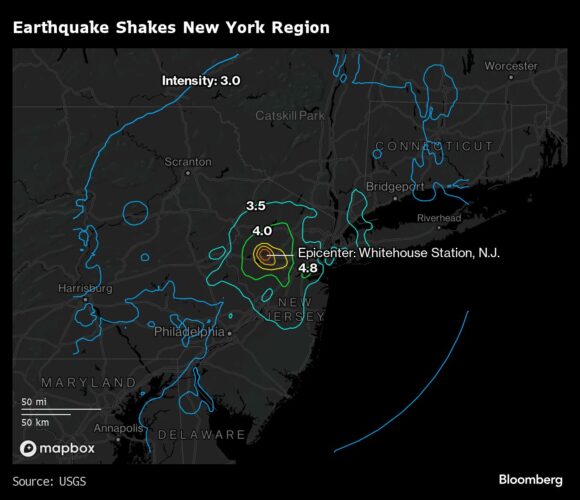The New York area’s strongest earthquake in 140 years rattled northern New Jersey on Friday morning, shaking office buildings in Manhattan and snarling travel.
The preliminary 4.8-magnitude temblor was the strongest in the New York area since 1884, according to the US Geological Survey. It occurred near Whitehouse Station, New Jersey, and was felt along the Acela rail corridor from Massachusetts to Washington, D.C.
An aftershock was reported around 6 p.m. local time. Initial indications suggested a 4.0-magnitude quake southwest of Gladstone, New Jersey, according to the USGS.
The earthquake caused travel delays throughout the New York area, with Newark’s Liberty International Airport resuming operations around midday after an earlier ground stop.
“So far so good, we have limited calls or reports of damage,” said New Jersey Governor Phil Murphy said on ABC News Live — hours before the dusk-time aftershock. “You never know what is around the corner.”
After the initial earthquake, President Joe Biden told reporters he’d spoken with Murphy and “things are alright.” New York Mayor Eric Adams said officials were checking for any damages while saying that preliminary reports don’t show any major safety or infrastructure issues.
Our preliminary reports do not indicate major life safety or infrastructure issues from the earthquake. We are performing thorough inspections of critical areas.
Orange & Rockland Utilities, a subsidiary of Consolidated Edison Inc., has been notified of two leaks, a spokesperson said earlier Friday.
The first was a gas leak at a private home in New York’s Rockland County and it was resolved with no injuries. The second leak was reported in New City around noon at another home, where people reported smelling gas. Workers from the utility are on the scene and expect to be able to resolve it quickly.
Major earthquakes are uncommon in the New York area, although a minor temblor occurred in January. Typically, quakes on the East Coast are felt over a wider area than out west because of the age of the rocks. The rocks in the east are more continuous, whereas they are broken up with faults in the west.
First responders and firefighters attend a call to check houses in Lebanon, New Jersey, after an earthquake on April 5.
“As I was closing the door to the house, I heard a loud crash and then everything started shaking,” said Nancy Rochelle, who lives in Lebanon, New Jersey. “I thought that the garage door was coming off of the tracks and that it was crashing. But then I realized the whole house was shaking and things were falling off of the shelf in the kitchen.”
More than 100 earthquakes have been recorded in that part of New Jersey, but most people don’t notice quakes until they reach magnitude 2 or higher, said Paul Caruso, a geophysicist with the USGS.
At the home of the “power breakfast” at the Regency Bar & Grill in midtown Manhattan, where Bridgewater Associates Chief Executive Officer Nir Bar Dea was having a morning meeting, diners were seemingly unfazed even as their chairs lightly rattled.
Closer to the epicenter in New Jersey, Trish Hegeman said she heard a “loud noise” and “rumbling.” She said it felt somewhat familiar to her because she used to live in California.
“It looks like we were right on top of it,” said Hegeman, executive director of Mane Stream, a nonprofit that provides horseback riding for children and adults with disabilities. “We had one picture that was propped up against the wall and it fell over.”
Her horses seemed fine though one whinnied during the tremor, she said. A driver who dropped by for a delivery told her the road “was waving,” she said.
Was this article valuable?
Here are more articles you may enjoy.


 Tesla’s Austin Robotaxis Report 14 Crashes in First Eight Months
Tesla’s Austin Robotaxis Report 14 Crashes in First Eight Months  Walmart to Pay $100 Million to Settle FTC Case on Driver Wages
Walmart to Pay $100 Million to Settle FTC Case on Driver Wages  Iran War Threatens Supply Disruptions for Agriculture Markets
Iran War Threatens Supply Disruptions for Agriculture Markets  Stellantis Weighs Using China EV Tech for Affordable Cars
Stellantis Weighs Using China EV Tech for Affordable Cars 